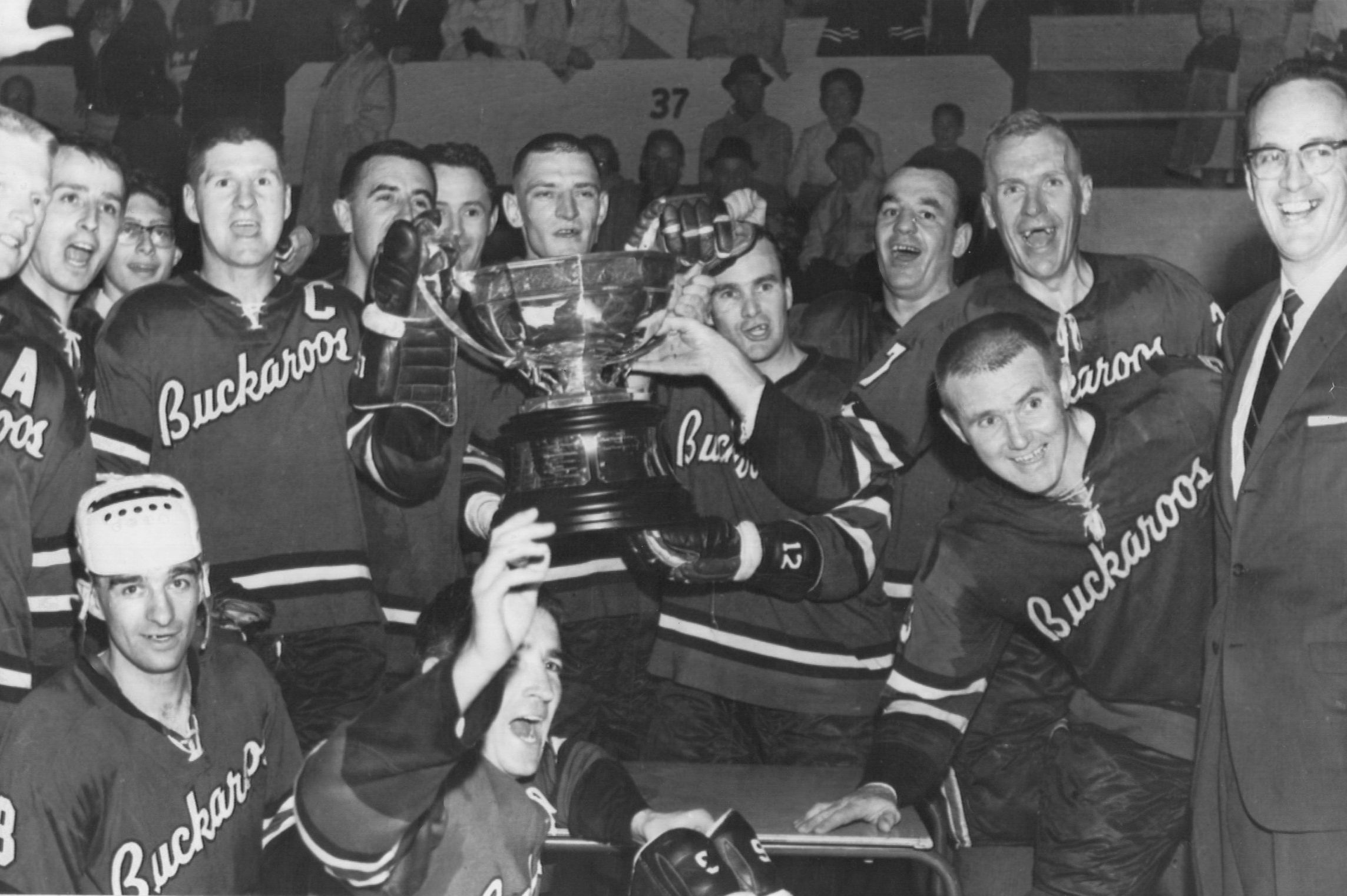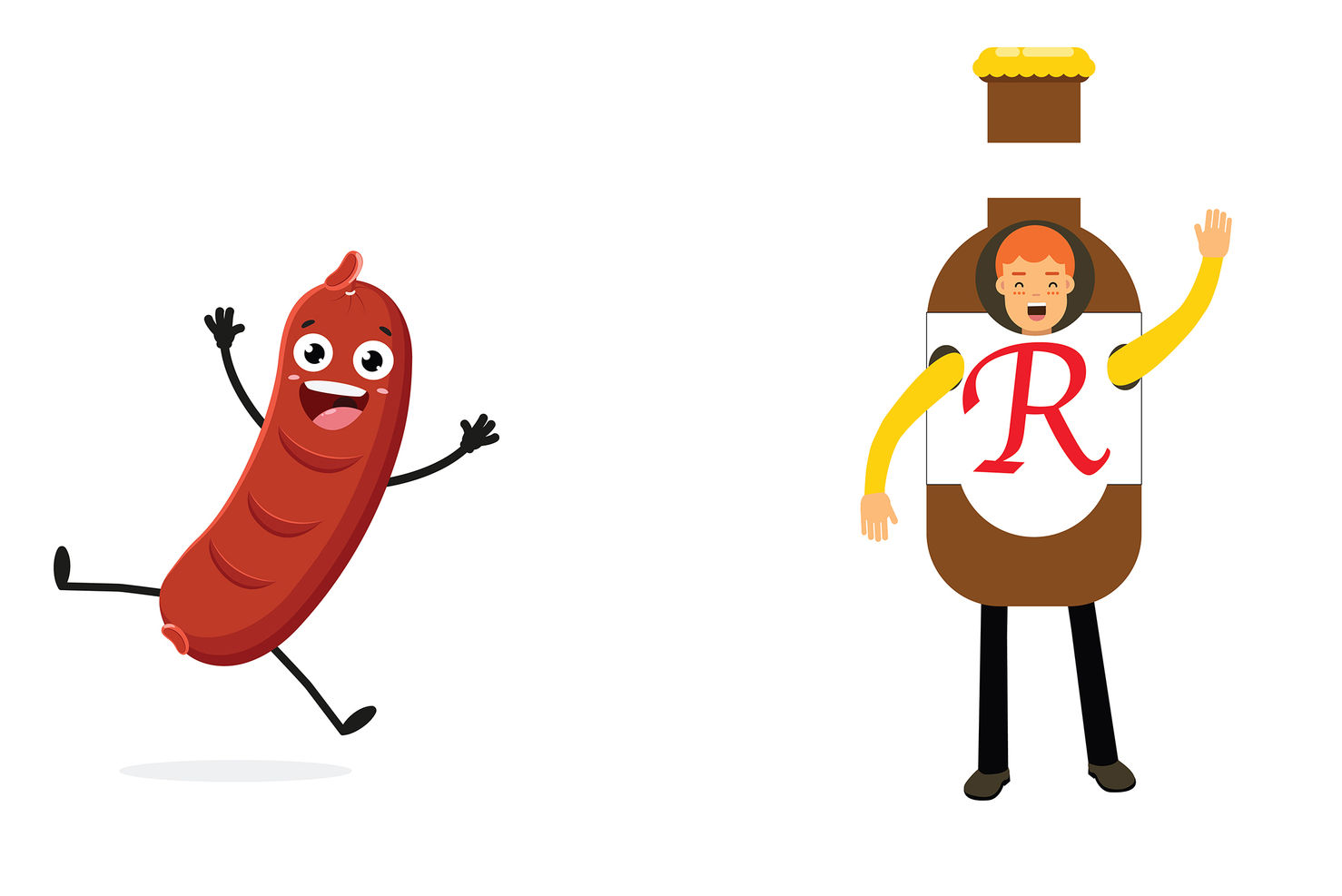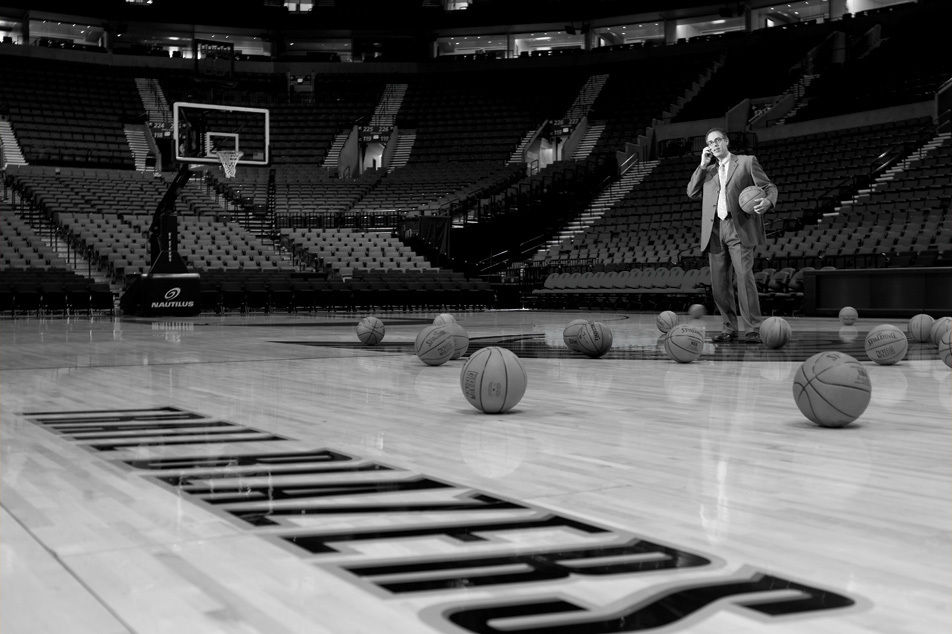
Calling the Shots
To be a general manager in today’s NBA is to manage complicated, often unrelated tasks and roles. You have to do everything a CEO does (delegate, set agendas, crunch numbers) and be everything a coach is (father figure, shrink, X’s-and-O’s guy). You’re the chief scout, lead negotiator and, whether you want to be or not, the top public relations man. Even the most essential schoolyard aspect of the job—choosing players for your team—demands the head of an economist, the stomach of a Teamsters’ lawyer and the nerves of Amarillo Slim. On any given day you just might stake your whole career on the maturity, ability—and, oh yeah, knee cartilage—of a seven-foot-tall teenager.
But most of all, you need to stay in close range of a power source. “I’m on my second charge of the day,” says Kevin Pritchard.
On a Friday afternoon in mid-July, the 40-year-old Trail Blazers general manager is tethered by his Blackberry to an electrical outlet on the sideline of a Las Vegas practice court. A little over two weeks ago, he’d made the most important call in his still-brief career: making Ohio State center Greg Oden the No. 1 NBA draft pick. Before him on the hardwood, other newly minted Blazers—like 19-year-old Finnish guard Petteri Koponen and 20-year-old former Duke forward Josh McRoberts—run drills to prepare for another contest in the NBA Summer League, which provides two weeks of dress-rehearsal action for young players. (Oden is no longer among them, having left Sin City to get his tonsils taken out after appearing in just two league games.)
It’s 2 p.m., and Pritchard’s PDA already has logged approximately 60 calls and messages, including a short note from team owner Paul Allen, information from the league office regarding details of a player’s contract, journalists asking about the Blazers’ signing of point guard Steve Blake, which has not yet been announced, and myriad bits of league gossip and “what-if?” trade proposals from his scouts and GM counterparts (which he is not about to share). Before the day is done, he’ll give the Blackberry a third charge. “That’s just business,” Pritchard says. “I’m in information-gathering mode all the time.”
Pritchard is trim and 6’4", though he doesn’t really seem that tall since he’s so often standing near an even higher-elevation player, or the Blazers’ 6’5" head coach Nate McMillan. He has gelled black hair that’s starting to go gray at the sides and prominent eyebrows that are sometimes underscored by cosmopolitan black glasses, worn in conjunction with a suit (and usually no tie) at press conferences. Today, in the 110-degree Nevada heat, he’s wearing contact lenses and appears resort-casual in a lime green, short-sleeved shirt; lurking around the Blazers’ practice facility in Tualatin he might also be found sporting head-to-toe logo wear, looking like the former coach and NBA player that he is. A native Hoosier who grew up in Kansas and Oklahoma before returning to the Jayhawk state for college, Pritchard has lived the game of basketball for almost his entire life.
As Blazers assistant coaches Monty Williams and Bill Bayno work with the team inside one half-court, a 13-year-old kid in a Kansas Jayhawks T-shirt and the same black shorts and red-and-white Reeboks that the coaches wear dribbles a ball near Pritchard, who played point guard for coach Larry Brown on the Jayhawks’ 1988 NCAA championship team. This is Kevin Pritchard Jr., or “K.J.”
“Hold the ball, Kage,” his father says when Williams gathers up the players for a talk. Pritchard, who is divorced and also has a 10-year-old daughter, Kendall, doesn’t care to divulge many more details about his family beyond that—but it might be fair to say that right now he’s married to the game. “The hardest thing in this business is balance,” he acknowledges. “Someone asked me the other day, ‘How many hours do you work?’ My response was, ‘How many hours am I awake?’ When you love what you do, you always tend to be on.”
Pritchard watches practice for a moment, then takes a few steps onto the court, his Blackberry now freed from its charging cable. He holds the phone up to his ear with one hand and tries for a half-hearted steal on K.J. with the other. Then he sits back down to take a call: “This is Kevin.”
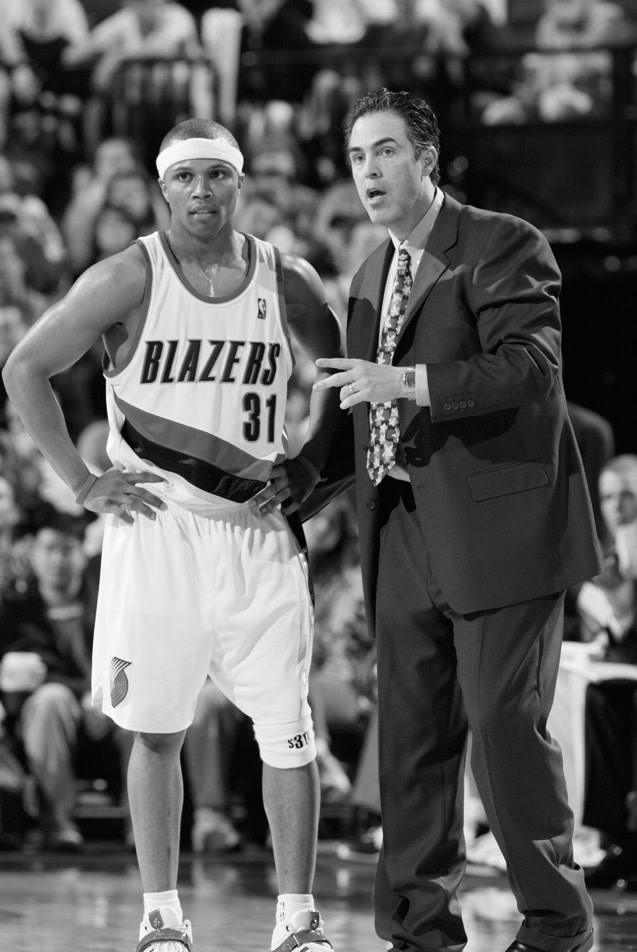
When practice closes with a free-throw contest, Pritchard and a couple of the scouts and coaches spice it with a wager on the final round. The GM goes with Taurean Green, the ropy little guard (in the NBA, six foot tall is little) out of the University of Florida, where he hit 86 percent of his foul shots and won two straight NCAA titles. Bill Bayno puts his chips on Josh McRoberts, who has 10 inches and 63 pounds on Green and was a 66-percent college free-throw shooter.
The two players match each other bucket-for-bucket over several rounds, and, college stats be damned, Green is the first to miss. “Taurean, you lost!” Pritchard yells in mock outrage, giving the rookie a playful shove. McRoberts, whose fresh-faced Duke visage has given way to tousled hair and four-day stubble (welcome to Portland, dude!) steps up to the line to end it, but Pritchard interrupts him. He walks over to the stripe, takes the ball and gives it back to McRoberts like he’s the referee. Then he leans into the player’s ear. No pressure, right? Just the GM giving a little quiet trash-talk to a second-rounder who isn’t guaranteed to see a single minute of real game action come fall. The playground fun is over: McRoberts may as well be shooting in the final second of a deadlocked playoff game.
Swish! McRoberts sinks it. Pritchard has lost the bet, but won himself a teaching moment. When the Blazers bring it in, he’s right there in the huddle with them. Seconds after that, his thumbs are back on the Blackberry.
It was pretty bad there for a while, wasn’t it? The blown Game Seven lead against the Lakers in 2000. The end of the franchise’s NBA-record, 21-year playoff streak in 2004. The firing of popular (if ineffective) coach Maurice Cheeks in 2005. The NBA’s worst record (21-61) in 2006. And of course, the ongoing mishaps and misbehaviors that led to the nickname “Jail Blazers,” making the team a mockery around the country. Even as the hiring of McMillan and the addition of eventual NBA Rookie of the Year Brandon Roy gave hoops fans something to fall for, Trail Blazers owner Paul Allen didn’t seem too interested in sparking the affair. Having put the Rose Garden into bankruptcy in 2004, the 11th-richest man in the United States (according to Forbes) also talked of selling the franchise. On some nights it was as easy to get a ticket to an NBA game in Portland as it was to see indoor lacrosse or junior hockey (and if you were targeted by the right discount or promotion, it was also cheaper).
Kevin Pritchard changed the vibe. From the day he got the job as general manager until Greg Oden took the Red Line MAX downtown to introduce himself to Portland three months later, Pritchard was the Blazers’ public face. Before that, he was the most important face behind the scenes—particularly on the night of the 2006 draft, when he orchestrated a flurry of trades and picks that brought not just Roy to Portland, but also his fellow impact rookie LaMarcus Aldridge, high-ceiling Spanish guard Sergio Rodriguez and British big-man project Joel Freeland, all in the first round.
It was an especially satisfying haul because the Blazers went into the 2006 draft lottery with the best (25 percent) chance of selecting first, but ended up at fourth. The Blazers then scored the top pick in 2007 despite having just the sixth-best (5.3 percent) chance, serendipity Pritchard ascribed to the ladybug pendant he’d been given by his daughter for the lottery.
But to Portland fans, the GM himself seemed like the good luck charm. The season they’d just watched, with the team that Pritchard had had such a big hand in shaping, had given Portland only 11 more wins than the 2006 team, but players like Roy and Aldridge offered something just as precious: hope.
Pritchard first came to Portland in August 2004 as the Blazers’ director of player personnel (a job that more or less translates as head of scouting) under John Nash, then GM; prior to that he’d been a scout for San Antonio, which has won four championships since 1999 and produced the same number of NBA GMs in just the past two years: Pritchard, Cleveland’s Danny Ferry, Seattle’s Sam Presti and Phoenix’s Steve Kerr. The Spurs are known for emphasizing defense, hard work and role players over flashy talents à la Kobe Bryant or Michael Jordan (which is not to say Spurs stars Tim Duncan, Manu Ginobili and Tony Parker are not three of the best players in the league).
During his first year with the Blazers, towards the end of the 2004-05 season, Pritchard also served as the Blazers’ interim head coach, bridging the gap between Maurice Cheeks and Nate McMillan. When then team president Steve Patterson took over the Blazers’ general manager’s responsibilities from Nash weeks before the 2006 draft, Pritchard was left as his top lieutenant. (Officially, Pritchard became assistant GM in October, when Patterson removed the “interim” from his own title.) When Patterson stepped down (on March 1, 2007), Paul Allen’s Vulcan Sports and Entertainment holding company conducted a national search for his replacement. But where there might have ordinarily been pressure to hire someone who was a bigger name or had previous GM experience, Pritchard was already both the popular favorite and the media favorite; he was elevated to the job March 29. “The arrow kept coming back to Kevin Pritchard,” says Vulcan CEO Tod Leiweke. “He really was becoming the symbol of what it was to be a Blazer.”
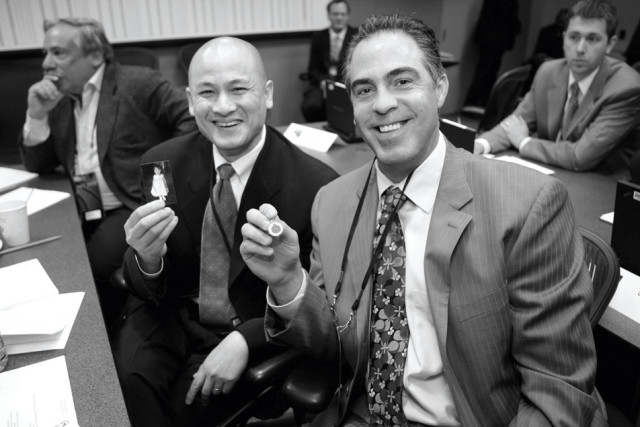
“I thought he was the general manager,” Brandon Roy says of his contact with Pritchard before being drafted. “He came to Seattle to watch me play, and when I worked out here in Portland I met with him, and he told me the things they were going to do. Even when [the 2006-07 season] started, you could sense he was really hands-on with the team. I could kind of tell one day he was probably going to be the general manager.”
In June, after the Blazers’ draft-lottery win, the respected NBA blogger Tom Ziller of AOL Sports wrote that Pritchard “completely destroyed everyone else in the 2006 draft thanks to massive balls; will destroy almost everyone this year thanks to ping-pong balls.” (The NBA draft lottery works the same way as the Powerball lottery.) But while Pritchard’s fortuitous top pick played out publicly as a PR campaign—the Blazers marketing team put up billboards around town urging fans to “honk once” for Oden or “honk twice” for University of Texas guard Kevin Durant—Pritchard and his scouting brain trust pored over everything they could find regarding both potential picks. Pritchard’s the kind of guy who thinks due diligence is sexy.
“Eyes, ears and numbers,” is how Pritchard sums up the calculus he uses to make a decision, meaning (in reverse order): what you learn from a player’s statistics (including all sorts of obscure measures and formulas you won’t find in the average game program); what you hear about from other people (in Oden’s case, everyone from his mother to his college coach to his high school principal); and what you see yourself, firsthand. “He asked a lot of questions,” says Oden of his pre-draft visit—in contrast to Paul Allen, who, according to Oden, was reserved, and McMillan, who has publicly admitted he was already drawing up plays for Oden in his head before the draft. “Kevin,” says Oden, “was the guy trying to figure out a lot more about me.”
Oden reminded Pritchard of San Antonio’s Tim Duncan, someone with a certain generosity of spirit and an eagerness to make his teammates better. At the Rose Garden press conference on the night of the draft, Pritchard dubbed Oden “The Caregiver,” explaining that the rookie had not just the raw talent, but also the character that embodied the “culture” of the NBA teams he most admired (namely, the Spurs).
For years, a quote from 19th-century muckraker Jacob Riis has hung in the San Antonio locker room: “When nothing seems to help, I go and look at a stonecutter hammering away at his rock, perhaps a hundred times without as much as a crack showing in it. Yet at the hundred and first blow it will split in two, and I know it was not that blow that did it, but all that had gone on before.” No doubt this remains in Pritchard’s mind when he explains his goal for the Blazers as “not just wins, but sustainable growth for a long time.”
At the Pioneer Courthouse Square rally for Oden on June 29, McMillan fêted Pritchard as “the guy who’s really responsible for the change in the last two years.” The crowd already knew it: “KP! KP!” they chanted, having fully bought into the Pritchard mantra: Culture, culture, culture. “If you’ve got a good culture, you can withstand a lot of issues,” he says. After two months on the job, Pritchard had used the word so many times that Dave Deckard’s Blazers Edge fan website and blog had a batch of $13 T-shirts printed up as a tribute: The Cult of KP: Changing the Culture One Interview at a Time.
Most NBA executives began as players.
Kevin McHale in Minnesota, Larry Bird in Indiana, Isiah Thomas in New York and many others—former superstars all, guys whom even casual fans remember from the playoffs on TV. Kevin Pritchard played professionally as well, but not so you’d remember: Selected in the second round of the 1990 NBA draft by Golden State, Pritchard suited up for 94 games with five NBA teams over half a dozen years; 62 of those games were in his rookie season. He also spent time playing for teams in Spain, Italy, Germany and in the Quad Cities for the minor league Continental Basketball Association. “I thought I was born to be a basketball player,” says Pritchard. “Now I know I wasn’t. I was born to be a general manager.”
To be on the receiving end of such a revelation, Pritchard had to travel the hoops wilderness—and then leave basketball entirely. Having retired as a player in 1997, he took a job in his old college town of Lawrence, Kan., as a money manager for Trust Company of America. “It was a miserable year-and-a-half,” Pritchard recalls.
So when a fledgling minor league calling itself the American Basketball Association put a team (called the Knights) in Kansas City’s Kemper Arena—the very building where Pritchard and his Jayhawks teammates won the Final Four in 1988—it didn’t take much for Pritchard to vacate his desk job. He was supposed to take the court as a player, but when the team’s original head coach was busted for cocaine possession several months before the season started, Pritchard agreed to take the job. And having taken the coaching job, there was no way he could play—there was too much work to be done.
The ABA was the sort of league where everybody slept four to a hotel room and Pritchard himself did everything from corporate sales to laundry. Despite this, he treated the preseason like his team was about to take on Jordan, Magic and Kareem, calling up every coach he’d ever had—including Larry Brown and Roy Williams, both of whom he’d played for in college—to pick their brains. He says he scripted his first 15 days on the job by “beginning with the end in mind,” a technique from Stephen Covey’s book The Seven Habits of Highly Effective People.
Two years later the Knights won a championship, but more important, Pritchard got a practical education in basketball multitasking—far more valuable than being an NBA star who went straight from his retirement ceremony to the front office. Every night at work he’d look up into the rafters of the Kemper Arena and see the Jayhawks 1988 NCAA championship banner, a reminder of his greatest moment as a player; every night at home he’d stare down the Post-It on his bathroom mirror saying he was going to be an NBA GM someday (another example of “beginning with the end in mind”).
“I wouldn’t change that experience for the world,” he says of his years with the ABA. “It set me up.”
Since then, Pritchard has approached every job he’s had as if he were one wrong move away from going back to the bush leagues. Complacency is his enemy, both on the court and in the boardroom. One of his mottos for the Blazers this season (he has used it as a sign-off in e-mails to every person working for the franchise) is “Stay Hungry, Stay Humble.”
Say one-third of a basketball team has so much talent they can get away with half-assing it; one-third has both talent and a good work ethic; and one-third gets by because of hard work. Pritchard prefers to forgo players from the first group, which is also how the Larry Brown-influenced management team of the San Antonio Spurs has gone about it. That’s what Pritchard means by “culture”— rituals, practices, clearly defined objectives and philosophies that emphasize unselfishness, hard work and putting the organization’s goals ahead of the individual’s goals. (In other breaking news, there is no “I” in “Team.”) As clichéd as certain “Pritchardisms” sometimes seem, his insistence that the Blazers won’t cut corners on character just to win more games is not always a given in the NBA.
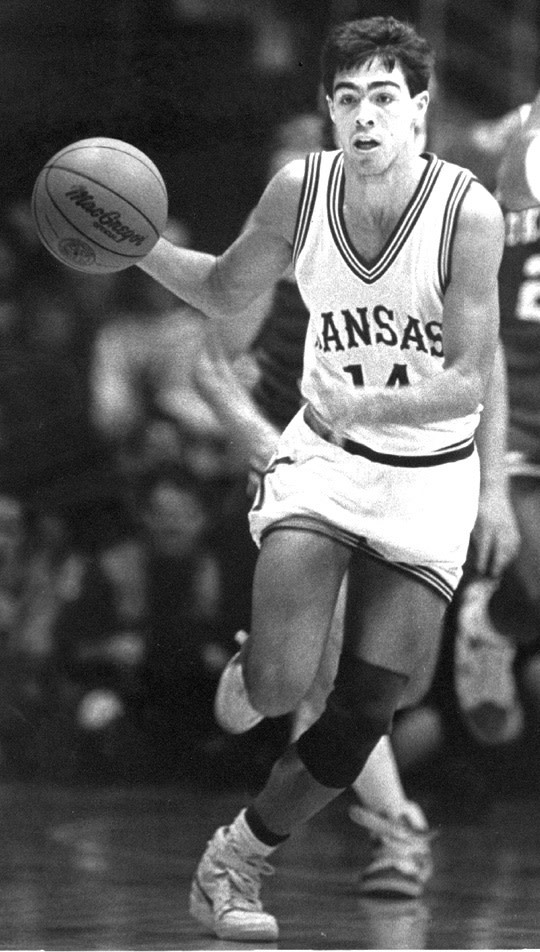
That’s something that the Blazers faithful know all too well. The “Jail Blazers” era began when the team was still competitive and featured players like Shawn Kemp (infamous from a 1998 Sports Illustrated cover story that identified him as the father of seven illegitimate children), Damon Stoudamire (multiple marijuana arrests), Ruben Patterson (who pled guilty to attempted rape while playing for Seattle in 2001) and Rasheed Wallace (one pot bust in the company of Stoudamire and the temperament of Family Guy’s Stewie on the court). When Patterson and Nash replaced Bob Whitsitt (who was both president and GM from 1994 until 2003) they made a “25 Point Pledge” to the city that included everything from promises to “establish a player code of conduct and to hold our players accountable for their actions both on and off the court” to providing “affordable in-arena food options for special game nights.”
But those promises were followed by Qyntel Woods’s dogfighting arrest and Darius Miles’s suspension for a heated off-court argument with Maurice Cheeks. In 2006, Sebastian Telfair was suspended for two games after he accidentally took a handgun on the team plane. Then there was Zach Randolph, who repaid the franchise for the six-year, $84 million contract extension he received in November 2004 by hanging out in strip clubs, which was duly reported by the media. In August 2006 he was accused of rape. (Criminal charges were never filed, and a civil suit brought by the alleged victim has been dismissed.)
Pritchard has forgone a pledge in favor of decisive action. McMillan, who was hired by Nash and Patterson: “He had an opportunity to coach this franchise at its roughest moment. He got a feel for what it was like to be on the sidelines, to listen to the fans’ comments, to coach the players that he had. He knows! A lot of those guys are gone now.” Indeed, there are only three players left (out of 15) from the Blazers roster that Pritchard briefly coached, and only five who played for Portland in 2005-06.
Pritchard is not just rebuilding a basketball team but building, to use his second-favorite buzzword, “a program.” It’s a collegiate word, because in college sports the coach, the system and the team are bigger than each individual player. This seems like a good approach for Portland, which has the sort of rah-rah passion for its only pro franchise that bigger cities can’t quite match. New York City and Los Angeles don’t have public rallies to introduce new coaches or players.
What’s more, the Blazers almost are a college team: The average age of the entire roster is just 23.7. When Oden came into town for his predraft workouts, Pritchard recruited Roy and Aldridge to go meet him at the airport and then show him around town. “I’m hosting Greg Oden like it’s a college visit,” says Roy. “I’m like, ‘I thought we just draft him and he comes.’ But it’s what they’re trying to build here. I like it. You look at the San Antonio Spurs and they probably have the best team in the last eight years, and it’s all about that camaraderie.”
“I think that shows what [Pritchard’s] about,” says Aldridge. “Team, family, guys being close, guys liking each other.”
ESPN.com’s J.A. Adande recently reported that when Pritchard got the job, he told Paul Allen he’d rather lose with the right players than win with the wrong players. That’s why it was hardly a surprise when the team traded Zach Randolph. (And perhaps it’s no coincidence Randolph landed with the Knicks, a team whose GM, Isiah Thomas, was recently found guilty of sexual harassment; and whose point guard, Stephon Marbury, admitted to having sex with a team intern in his truck outside a strip club.)
Pritchard has never said a negative public word about “Z-Bo” (“I wouldn’t be surprised if he’s an all-star in the East,” was his comment on the night of the trade), but he will say that he prefers guys who “do things the right way before anything else.”
“If you play harder, if you play smarter, if you play more unselfish, you’re going to win a lot of games,” Pritchard adds. “It’s that simple. I don’t care what you tell me—that’s my foundation. You’re not getting me off my foundation.”
Early on the afternoon of September 13, Pritchard huddles with McMillan and Trail Blazers president Larry Miller in a concrete-floored Rose Garden hallway outside a room packed with reporters. Greeting a passerby, he smiles gamely, but the mood under the soft fluorescent light is undeniable—three men steeling themselves to give a eulogy.
As everyone from Gresham to Kazakhstan found out that day (ESPNews carried the press conference live), Greg Oden almost certainly won’t take the court this season, due to an injured knee that required microfracture surgery. Judging from the best-case comebacks of other players who have had the same procedure (including the Phoenix Suns’ Amare Stoudamire and none other than Zach Randolph), he could also be a little ginger in 2008-09. While delivering his official statement, Pritchard’s voice catches several times, and he looks more tired than he ever did during the weeks before the draft.
There’s no doubt this is a major setback—for one thing, most of Pritchard’s moves revolved around a plan to let the team’s young core (Roy, Oden and Aldridge) develop for the next two seasons. By then he’d have a sense of who belonged as well as enough salary-cap room to add a major piece (“a closer,” in Pritchard’s draft-day parlance) via free agency. More imminently, there is no way to replace the big guy as a box-office draw, let alone a civic superhero. The NBA and its two cable partners didn’t peg the Blazers for 12 national TV games because of Taurean Green and Josh McRoberts. Season ticketholders didn’t wonder about refunds after Darius Miles’s microfracture surgery. Oden’s injury felt like the big karmic correction—the good luck of the draft lottery and exuberance at his arrival instantly replaced by existential dread and memories of Bill Walton and Sam Bowie. Oh, right. We’re Portland. City of roses, rain, and injury-prone big men.
But is Kevin Pritchard worried? Sorry? Dripping with regret about the pick? Not even a little. The GM who’d rather lose with the right players than win with the wrong ones would also rather have the right injured player than the wrong healthy player. Pritchard didn’t select Greg Oden for his knees, or even his overall ability to play the game. He selected the whole person. He selected “The Caregiver.”
So when Oden came out of anesthesia on that September morning, even as Portland’s collective sports-fan heart was about to shatter and the ESPNocracy began polishing their puns (“Mo-rose City,” “Sam I Am?”), Kevin Pritchard looked at his wounded gentle giant and felt awful—but as good about the fact that Greg Oden was a Blazer as he ever had. The persistent lump in Pritchard’s throat during the press conference was not that of an NBA muckety-muck whose job just got a lot harder—it was more like that of a father who just left his son’s hospital bed.
“Greg looked at me as he was coming out of his surgery and he and his mom, Zoe, probably said ‘sorry’ 20 times,” Pritchard recounted to the media throng that night. “I could feel the weight of the world on his shoulders…. My first thought was how lucky we were to have a guy that cares about the organization so much, and secondly, we’ve got to help this kid through it. We picked the right kid.”
The right kid for the Portland Trail Blazers. The right kid for the “culture.” The right piece of the foundation. And you’re not getting Kevin Pritchard off of his foundation.
“Whether we’ll win a championship, I don’t know,” he says. “A lot of things have to happen. But I do know this: We’re going to be a team that’s going to be easy to watch and easy to be proud of. And that’s where I start every morning. Because if I’m not proud of the team, then how can I expect anybody else to be?”
